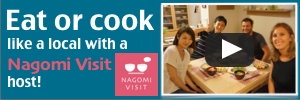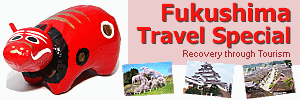Ryogoku (両国, Ryōgoku) is a district of Tokyo where the sumo stadium, many sumo stables, chanko restaurants and other sumo related attractions can be found. It is the center of the sumo world. Sumo events have been staged in this area since a long time before, but until the beginning of the 20th century, sumo tournaments were held outdoors at shrines and temples.
In 1909, the first permanent sumo hall was built in the Ryogoku area. Today's sumo stadium, the Kokugikan, is the fourth built in Tokyo and has been in use since 1985. It seats over 10,000 visitors and hosts three of the six annual sumo tournaments (in January, May and September).
Chanko nabe served at a restaurant which features a dohyo (sumo ring)
Sumo stables are the places where sumo wrestlers live and train. Among the several dozens of sumo stables currently in existence, many are located in the Ryogoku area. At some stables, it is possible to view the sumo practice in the early morning hours. Most of them require advance applications by phone and some request that guests are accompanied by a Japanese speaker.
Chanko nabe is the staple food of sumo wrestlers. It is a hot pot dish that comes in many varieties and contains vegetables, seafood and meat. There are several restaurants in the Ryogoku area that feature chanko nabe on their menus. Many of the restaurants are managed by retired wrestlers.
Other places of interest in the Ryogoku district are located within walking distance of Ryogoku Station and the sumo stadium, including the excellent Edo-Tokyo Museum on Tokyo's history and culture, the Sumida Hokusai Museum, one of Japan's best ukiyo-e museums, and Yokoamicho Park which commemorates the two most destructive events to hit the capital during the 20th century: the Great Kanto Earthquake of 1923 and the fire bombings of World War Two.
Kokugikan Sumo Stadium
The Kokugikan seats over 10,000 visitors and hosts three of the six annual
sumo tournaments (in January, May and September). On non-tournament days, a small sumo museum and a shop selling various sumo goods are open to visitors. During tournaments, they are only accessible to ticket holders.
Edo-Tokyo Museum
Through numerous models of towns, figurines, life-sized figures and many other exhibits, this outstanding museum vividly illustrates the past of
Tokyo.
Sumida Hokusai Museum
Opened in 2016 in
Tokyo's Sumida City Ward, the birth place of Katsushika Hokusai, the well-done, fully bilingual
Sumida Hokusai Museum features a permanent exhibition room with Hokusai's works through his life and interesting general information about
ukiyo-e, as well as exhibition space for rotating, temporary exhibitions related to the great painter.
Tokyo Memorial Hall
Located in Yokoamicho Park, the memorial hall serves to remember the victims of the Tokyo air raids during World War Two. Peace is advocated, and prayers for the victims can be made. Next to the hall stands a memorial monument for the Korean victims, as well as a peace monument.
Great Kanto Earthquake Memorial Museum
Also located in Yokoamicho Park, this museum displays remains of the
Great Kanto Earthquake of 1923, as well as items which demonstrate the aids which foreign countries rendered to help Tokyo in the aftermath of the disaster.
Kyu-Yasuda Teien Garden
The Kyu-Yasuda Teien
Garden has a pond in the shape of the Japanese
kanji "kokoro", meaning "heart". It is known to be a garden representative of a
Meiji Period style garden.














